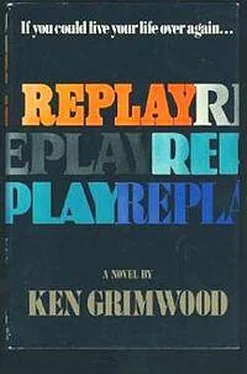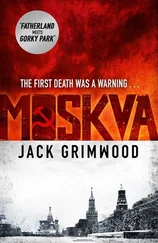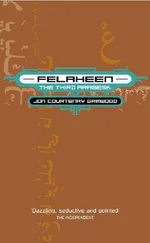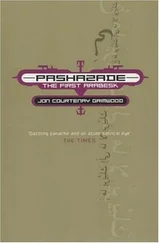She grimaced. "I was a college hippie. Leather fringe and tie dye. I hope you never listened to me talking to my friends; I probably said far out a lot."
Jeff kissed the tip of her nose. "You were cute. Are cute," he corrected, brushing her long, straight hair away from her face. "But I couldn’t help imagining all these kids fifteen years from now, wearing three-piece suits and driving BMW’s to the office."
"Not all of them," she said. "Bard turned out a lot of writers, actors, musicians … and," she added with a rueful grin, "my husband and I didn’t have a BMW; we drove an Audi and a Mazda."
"Point granted." He smiled, and took a sip of champagne. They lay together contentedly, but Jeff could see the gravity beneath her cheerful expression.
"Seventeen months," he said.
"What?"
"I lost seventeen months this time. That’s what you were wondering, wasn’t it?"
"I’d been wanting to ask," she conceded. "I couldn’t help but wonder. My skew is up to … This is March, you said? '68?"
Jeff nodded. "Three and a half years."
"Counting from last time. It’s five years off from the first few replays. Jesus. Next time I could—"
He put a finger to her lips. "We were going to concentrate on this time, remember?"
"Of course I do," she said, snuggling closer to him beneath the covers.
"And I’ve been thinking about that," he told her. "I’ve had awhile to consider it, and I think I’ve come up with a plan, of sorts."
She pulled her head back, looked at him with an interested frown. "What do you mean?"
"Well, first I thought about approaching the scientific community with all this—the National Science Foundation, some private research organization … whatever group might seem most appropriate, maybe the physics department at Princeton or MIT, somebody doing research on the nature of time."
"They’d never believe us."
"Exactly. That’s been the stumbling block all along. And yet we’ve done our part to maintain that obstacle, by remaining so secretive each time."
"We’ve had to be discreet. People would think we were insane. Look at Stuart McCowan; he—"
"McCowan is insane—he’s a killer. But it’s no crime to make predictions of events; nobody would lock us up for doing that. And once the things we predict have actually happened, we’ll have proven our knowledge of the future. They’d have to listen to us. They’d know something real—unexplained, but real—was going on."
"How would we get in the front door to begin with, though?" Pamela objected. "No one at a place like MIT would even bother looking at any list of predictions we gave them. They’d lump us in with the UFO fanatics and the psychics the minute we told them what we had in mind."
"That’s just the point. We don’t approach them; they come to us."
"Why should—You’re not making sense," Pamela said, shaking her head in confusion.
"We go public," Jeff explained.
This time there was no need for the global-saturation coverage they had employed with their previous ad, the small one with which they had hoped to attract the attention only of other replayers. Also, both the ambiguity and anonymity of that first notice were unnecessary for their present purpose.
The New York Times refused to carry the one-time-only, full-page ad, but it ran in the New York Daily News, the Chicago Tribune, and the Los Angeles Times.
DURING THE NEXT TWELVE MONTHS:
• The U.S. nuclear submarine Scorpion will be lost at sea in late May.
• A major tragedy will disrupt the American presidential campaign in June.
• The assassin of Martin Luther King, Jr., will be arrested outside the United States.
• Chief Justice Earl Warren will resign on June 26th, and will be succeeded by Justice Abe Portas.
• The Soviet Union will lead a Warsaw Pact invasion of Czechoslovakia on August 21st.
• Fifteen thousand people will be killed in an earthquake in Iran on the first of September.
• An unmanned Soviet spacecraft will circle the moon and be recovered in the Indian Ocean on September 22nd.
• In October, there will be military coups in both Peru and Panama.
• Richard Nixon will narrowly defeat Hubert Humphrey for the presidency.
• Three American astronauts will orbit the moon and return safely to earth during Christmas week.
• In January 1969, there will be an unsuccessful assassination attempt against Soviet leader Leonid Brezhnev.
• A massive oil spill will contaminate the beaches of Southern California in February.
• French President Charles de Gaulle will resign at the end of next April.
We will have no further comment to make on these statements until May 1, 1969. We will meet with the news media on that date, at a location to be announced one year from today.
Jeff Winston & Pamela Phillips
New York, N.Y., April 19, 1968
Every seat of the large conference room they had rented at the New York Hilton was occupied, and those who could not find a chair milled impatiently in the aisles or at the sides of the room, trying to keep their feet from becoming entangled in the snaking microphone and television cables.
At 3:00 P.M. precisely, Jeff and Pamela came into the room and stood together on the speaker’s platform. She smiled nervously as the blinding lights for the TV cameras came on, and Jeff gave her hand an encouraging, unseen squeeze. From the moment they’d walked in, the room was a hubbub of shouted questions, the reporters all vying at once for their attention. Jeff called several times for silence, finally got the level of noise down to a dim roar.
"We’ll answer all your questions," he told the assembled journalists, "but let’s establish some kind of order here. Why don’t we take the back row first, one question per person, left to right. Then we’ll move to the next row, in the same order."
"What about the people who don’t have seats?" cried one of the men at the side of the room.
"Latecomers take their turns last, left side of the room first, back to front. Now," Jeff said, pointing, "we’ll take the first question from the lady in the blue dress. No need to identify yourselves; just ask anything you like."
The woman stood, pen and pad in hand. "The most obvious: How were you able to make such accurate predictions about such a wide range of events? Are you claiming to have psychic powers?"
Jeff took a deep breath, spoke as calmly as possible. "One question at a time, please, but I’ll answer both of those this once. No, we do not pretend to be psychic, as that term is commonly understood. Both Miss Phillips and I have been the beneficiaries—or the victims—of a recurring phenomenon that we initially found as difficult to believe as you undoubtedly will today. In brief, we are each reliving our own lives, or certain portions of them. We both died—will die—in October 1988 and have returned to life and subsequently died again, several times over."
The noise that had greeted them as they entered the room was nothing compared to the pandemonium that ensued at this statement, and the overall derisive tone of the cacophony was unmistakable. One television crew shut off its lights and began packing away its equipment, and several reporters stalked out of the room in an insulted huff, but there were many others eager to take the vacated seats. Jeff signaled for quiet again, pointed to the next journalist in line for a question.
"This one’s obvious, too," the portly, scowling man said. "How the hell do you expect any of us to believe that crap?"
Jeff maintained his composure, smiled reassuringly at Pamela and calmly addressed the scornful crowd. "I told you before that what we have to say will seem barely credible. I can only point to the complete validity of the predictions we published a year ago—which were already memories, to us—and ask that you reserve judgment until you’ve heard us out."
Читать дальше












